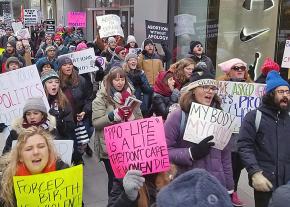Marching for our right to decide
reports on a counterprotest against the recent "March for Life" held in Chicago, and the need to fight for reproductive justice.
ON JANUARY 14, a crowd of over 300 people gathered on Chicago's Dearborn Street to protest an anti-choice rally billed as the "March for Life."
The pro-abortion group picketed in a circle with signs that read "Keep abortion safe and legal" and "Every woman willing, every child wanted," among other slogans. Chants of "Stand up, fight back" energized the crowd.
Since Roe vs. Wade, the 1973 Supreme Court decision legalizing abortion, the March for Life has held annual rallies in multiple cities across America. By bussing in high school and university students from around the Midwest to Chicago's Federal Plaza, the Chicago anti-choice movement draws hundreds of protesters every year in an attempt to demonstrate that its regressive attitudes toward reproductive health care have support.
DePaul's Students for Reproductive Justice, the International Socialist Organization, Democratic Socialists of America, Chicago Campaign to Expose Crisis Pregnancy Centers, Gay Liberation Network, the ANSWER Coalition, the Illinois Caucus for Adolescent Health, and Femmepowerment were among those who participated in the counterprotest.

Noting that a reliance on politicians to protect reproductive rights has resulted in a slow decay of the right to choose abortion since the 1970s, Moira, a speaker from the International Socialist Organization, articulated before the march, "Public opinion is on our side...and we know we can't wait on politicians to do it for us...This is about building our own movement."
Between chants of "However we dress, wherever we go, yes means yes, and no means no," "Anti-choice, you're the killer; we remember Dr. Tiller," and more, speakers reminded the group just what the fight for reproductive justice is about. Speakers voiced an understanding of the complexity of reproductive rights--that we fight not only for the right to safe, legal, and free abortions on demand, but also for the right to affordable health care, expanded contraceptive options, and all the resources needed to raise healthy children.
Many noted the violence of the anti-choice movement against abortion providers. Mary, a health care provider herself training to become an abortion provider, told the crowd that "if the pro-life movement were truly pro-life, they wouldn't try to kill me. We can be whatever we want, and one of the things we want is to be a pain in their ass."
Katie, a speaker for the Midwest Access Coalition, highlighted the hypocrisy of the anti-choice movement's alleged "values," stating, "I'm a proud Midwesterner. I value family, religion, calling it 'pop,'...I believe that every Midwesterner deserves access to safe and legal abortion. Every Midwesterner deserves a place to sleep and feel safe if they come to Chicago [for an abortion]."
Loreen, a representative for the Democratic Socialists of America highlighted the injustices and double standards in the right-wing agenda. "The anti-choice movement treats all women as incubators first and people second," she said. "Fathers are never legally bound to make a bodily sacrifice for their children, but for women, freedom which would never be taken from a man certainly is."
Stephanie, a speaker from the ANSWER Coalition, spoke to the goals of the counterprotest, saying that we were not merely standing for abortion rights, but were "demanding an end once and for all to sexual assault, rape...and all forms of bigotry...Women and LGBTQ people--we are the resistance. We will have real power over every single one of the decisions made over our bodies and lives."
Others spoke to the importance of a grassroots movement and a push for justice that thrives off of the energy of activists, not politicians. Roger, a speaker from the Gay Liberation Network, brought an historical perspective:
I remember when Roe v. Wade was won, and opposition to the decision grew only with the bigotry of the Religious Right...Those nine justices didn't make their decision because they thought abortion was "right." No! They were made to do so by the people like us--people fighting for abortion rights. And we must struggle more. We refuse to have our movement hijacked by politicians.
AFTER REPRESENTATIVES from participating organizations had concluded their statements, the group began to march, chanting and holding signs. Chicago's State Street rang with chants of "Abortion is a human right, not just for the rich and white," "Back allies no more, abortion for the rich and poor," and "My body, my choice," as the marchers made their way to the Chicago Cultural Center.
Maisie, who had come to the counterprotest by herself, explained, "I have friends and family members who have had abortions and don't feel they can talk about it. So I am here for them. And I'm here because I was raped and if that rape had ended in a pregnancy I might have chosen to have an abortion. I think everyone has the right to decide for themselves without shame."
For years the anti-choice movement has deliberately fostered and developed hard far-right elements within it. This was on display at the demonstration in Chicago when about eight members of the neo-Nazi group Patriot Front showed up with American flag bandanas and sunglasses covering their faces. They stood behind a banner on a corner across from the counterprotest.
Although tiny, the presence of open Nazi elements in showing up reflects both the confidence of the far-right under a Trump presidency and the urgent need to organize mass responses to their attempts to organize while they are still small to prevent their growth.
After the march ended, pro-choice activists met at the Chicago Cultural Center to wrap up and assess the day's action. The racist, classist, and sexist attitudes of the anti-choice movement, while not a majority opinion in the United States, must be treated seriously as threats. The protest of the March for Life helped ensure that their backward views did not go unopposed in Chicago--and reflects the need to organize a larger movement for reproductive justice in the streets.


